What is trait theory of leadership pdf
Trait Leadership. Trait leadership focuses on the leader and the traits he exhibits. Certain types of traits make leaders more effective. For example, the late Steve Jobs was known for his charisma.
the nature of leadership will be discussed: how trait leadership is different from leadership as a process, how emergent and appointed leadership are different, and how coercion, power, and management are different from leadership.
trait theory provides a base for measurable and testable characteristics such as virtues, race, gender, height, appearance, psychological factors, efficacy factors, cognitive factors, and INTERNATIONAL JOURNAL OF LEADERSHIP STUDIES 9
Great Man Theory and Trait Theory of Leadership! 1. Great Man Theory of Leadership: One of the early notions of leadership, which is still popular in certain circle, is that leadership is an inborn quality. This is the Great Man Theory of leadership which asserts that leaders in general and great
The 14 Leadership Traits below are time tested and proven character attributes that every leader must possess to reach his or her full potential. Justice – Justice …
Foundations of Leadership – Summary chart of leadership perspectives/theories/models – V. Harwood Page 2 Trait Theory what the leader is
6.4 TRADITIONAL LEADERSHIP THEORIES. Traditional leadership theories include: (1) trait approaches, such as the ‘great man theory’, which emphasise personal characteristics of the leader; (2) leadership style approaches, such as, the Ohio and Michigan State studies in the 1960s, which emphasise leader behaviours; and, (3) contingency approaches
theories were highly popular. These theories asserted that leadership qualities These theories asserted that leadership qualities were inherited, especially by people from the upper class.
Leadership is an integral part of work and social life. In fact in any given situation where a In fact in any given situation where a group of people want to accomplish a common goal, a leader may be required.
Trait theories argue that effective leaders share a number of common personality characteristics, or “traits.” Early trait theories said that leadership is an innate, instinctive quality that …
4 REVIEW OF LEADERSHIP THEORY A review of the leadership literature reveals an evolving series of ‘schools of thought’ from “Great Man” and “Trait” theories to “Transformational” leadership …
Trait theory in Leadership Essay Example Graduateway
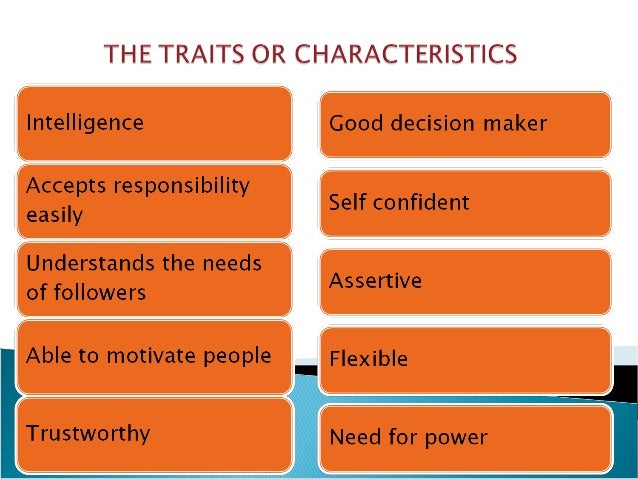
What Is The Trait Theory Of Leadership? YouTube
Proponents of trait theories believe that a leader is “born.” They often describe leaders in terms of their personal characteristics, such as “charismatic” and “driven.” Behaviorists believe leadership can be taught, or nurtured, by providing the necessary skills to an …
The trait approach of leadership has a century of research to back it up. No other theory can boast of the breadth No other theory can boast of the breadth and depth of studies conducted on it (Northouse, 2007; Hunt, 1991).
The basic premise behind trait theory was that effective leaders are born, not made, thus the name sometimes applied to early versions of this idea, the “great man” theory. Many leadership studies based on this theoretical framework were conducted in the 1930s, 1940s, and 1950s. Leader trait research examined the physical, mental, and social characteristics of individuals. In general
The trait theory of leadership is an early assumption that leaders are born and due to this belief, those that possess the correct qualities and traits are better suited to leadership.
you develop your own leadership abilities. Trait Theory. Similar to the Great Man theory, Trait theory suggests that the characteristics or the personality of a person may make them an effective leader. Several academics believe that potential leaders can be spotted by studying the personality traits of the individual and matching them to the characteristics of actual leaders. Trait theory was
6.4.1 Trait Theories. Trait theories of leadership identify the specific personality traits that distinguish leaders from non-leaders. They are based on the premise that leaders are ‘born, not made’ (i.e., that leadership is largely innate, rather than being developed through learning).
The trait theory of leadership is a model based on the notion that people are born with characteristics and personalities that make them either leaders or non-leaders.
Leadership trait theory is the idea that people are born with certain character traits or qualities. Since certain traits are associated with proficient leadership, it assumes that if you could identify people with the correct traits, you will be able to identify leaders and people with leadership potential.
While most research today has shifted from traditional trait or personality-based theories to a situation theory, which dictates that the situation in which leadership is exercised is determined by the leadership skills and characteristics of the leader (Avolio, Walumbwa, & Weber, 2009), all contemporary theories can fall under one of the following three perspectives: leadership as a process
Trait Theory of Leadership is based on the assumption that people are born with inherited traits and some traits are particularly suited to leadership. People who make effective leaders have the right (or sufficient) combination of traits and great leaders has some common personality characteristics. Trait theories help us identify traits and dispositions that are helpful when leading others

Participative leadership theories suggest that the ideal leadership style is one that takes the input of others into account. These leaders encourage participation and contributions from group members and help group members feel more relevant and committed to the decision-making process. In participative theories, however, the leader retains the right to allow the input of others.
trait-behavioral model of leadership effectiveness and then exam- ining the relative validity of leader traits (gender, intelligence, personality) and behaviors (transformational-transactional, initiat-
Trait Leadership Theory is actually a range of theories which share the belief that all leaders are born with, or at least display, certain key personality traits. Since certain traits are associated with proficient leadership, if one could identify people with the correct traits, one would be able to …
What is the Trait Theory of Leadership? The search for the characteristics or traits of leaders has existed for centuries. History’s greatest philosophical writings from Plato’s Republic to Plutarch’s Lives have explored the question of, “What qualities distinguish an individual as a leader?”
A short history of leadership theories By Gene Early Our world is changing and so is our understanding of leadership. From the Great Man Theory of the 19th century, to new research on genetic factors underpinning leadership
Leadership and Management Theories Revisited Mona Toft Madsen DDL Working Paper No. 4 October 2001. ii The DDL project The Danish Management Barometer (in Danish: Det Danske Ledelsesbarometer or the DDL project) is a research project carried out in cooperation between researchers at the Aarhus School of Business and the Danish Association of Managers and …
Behavioral theories of leadership are classified as such because they focus on the study of specific behaviors of a leader. For behavioral theorists, a leader behavior is the best predictor of his leadership influences and as a result, is the best determinant of his or her leadership success.
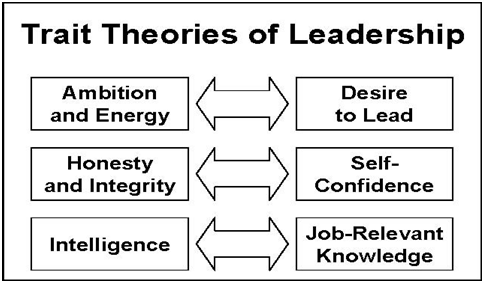
Global Definitions of Leadership and Theories of Leadership Development: Literature Review A Literature Review . University of Cambridge Institute for Sustainability Leadership 2 Introduction The University of Cambridge Institute for Sustainability Leadership (CISL) was commissioned to conduct a literature review on leadership and leadership development by the British Council. The purpose was
of leadership theory from its initial focus on Great Man and trait theory to the contemporary study of transformational leadership theory offered by Bass. Although the theoretical underpinnings of leadership theory have changed over
1/01/2019 · What is the trait theory of personality KNOW MORE ABOUT What is the trait theory of personality Advertisements what does trait theory teach us about ourselve… What is the trait theory …
on detail, the trait theory of leadership provided a characteristic that could be reliably tested. As it As it is related to personality of the leader, the next requirement was a reliable and valid measure.
Understand trait theory of leadership is and how you can
Trait theory of leadership A trait theory of leadership is often referred to as “the one best way” view of leadership. Early leadership studies focused on trying to identify what qualities and traits great leaders possessed.
The focus of the skill theorists were the skills that made leaders effective. Emphasis however, always remained on leadership as a skill. The most important similarity between the traits and skills theory is that both have the leader at their centre.
8/09/2011 · Trait Theories . Trait Theories can be described as a branch of the Great Man Theory. These theories hypothesize that the specific traits of an individual give them better propensity to be a leader. These personality traits or behavioral characteristics are inherent in the family and passed on genetically. This theory emphasizes that leaders share many common traits and characteristics that
Trait Theory of Leadership The trait model of leadership is based on the characteristics of many leaders – both successful and unsuccessful – and is used to predict leadership effectiveness. The resulting lists of traits are then compared to those of potential leaders to assess their likelihood of success or failure.
• Some personality traits may lead people naturally into leadership roles. This is the Trait Theory. • A crisis or important event may cause a person to rise to the occasion, which brings out extraordinary leadership qualities in an ordinary person. This is the Great Events Theory. • People can choose to become leaders. People can learn leadership skills. This is the Transformational or – characteristics of democratic leadership pdf Trait theories indicate that the traits are always constant regardless of the situations. An individual, as a whole, doesn’t just have a single trait, but the variety of trait forms of personality. These trait forms are unique from one individual to another.
Leadership trait theory is one of the earliest theories of leadership, which can be traced back to Thomas Carlyle’s 1849 assertion that “the history of the world was the biography of great men”.
Situational leadership theory proposes that effective leadership requires a rational understanding of the situation and an appropriate response, rather than a charismatic leader with a large group of dedicated followers (Graeff, 1997; Grint, 2011).
The trait approach to leadership was one of the earliest theories of leadership. Although it is not a fully articulated theory with well-developed hypotheses, the trait approach formed the basis
Trait Theory. Eysenck and The Big Five Trait Is a dimension of personality used to categorise individuals according to the degree to which they
Leadership: Theories and Controversies By Linda D. Henman, Ph.D. One of the most intriguing expressions of human behavior is the leader-follower phenomenon. Since the beginning of civilization, people have sought answers to the questions of who becomes a leader and why. Philosophers, political scientists, and psychologists have produced extensive literature on leaders and leadership, but
What is Leadership? Leadership South West Research Report 1 Contents Leadership South West Introduction 3 Defining Leadership 4 Leadership and Management 6 Theories of Leadership 9 Leadership Competencies 15 Leadership and Performance 19 The Shadow Side of Leadership 25 The Future of Leadership 28 Further Reading and Resources 31 References 32 Appendix 1: Portfolio of …
question is one of the difficulties in using trait theories to explain leadership. 3. Contingency Theories: Contingency theories of leadership focus on particular variables related to the environment that might determine which particular style of leadership is best suited for the situation. According to this theory, no leadership style is best in all situations. Success depends upon a number
leadership focus that included greater reliance on trait theory where ideal leaders were considered to have the greatest number of personality traits and attributes (Bass, 1990). Through
The leadership literature suffers from a lack of theoretical integration (Avolio, 2007, American Psychologist, 62, 25–33). This article addresses that lack of integration by developing an integrative trait‐behavioral model of leadership effectiveness and then examining the relative validity of leader traits (gender, intelligence
Trait theory in Leadership Essay Trait theory in leadership is the belief that all leaders display certain key personality traits. The theory attempts to identify universally applicable characteristics that distinguish leaders from other people.
Trait Approach DescripTion Of interest to scholars throughout the 20th century, the trait approach was one of the first systematic attempts to study leadership. In the early 20th century, leadership traits were studied to determine what made certain people great leaders. The theories that were developed were called “great man” theories because they focused on identifying the innate
Organizational Behavior Leadership – Tutorials Point
The trait approach within leadership began with an emphasis on identifying the qualities of great people, but it has now shifted back to putting emphasis on the critical role of traits in effective leadership.
According to this theory, leadership behavior is the sum total of all traits that a leader possess. Thus this theory gives the profile of a successful and complete leader. According to this theory, there are five human traits.
The trait theory of leadership focused on analyzing mental, physical and social characteristic in order to gain more understanding of what is the characteristic or the combination of characteristics that are common among leaders. There were many shortfalls with the trait leadership theory. However, from a psychology of personalities approach, Gordon Allport’s studies are among the first ones
A theory of leadership that states that the level of stress in a situation is what impacts whether a leader’s intelligence or experience will be more effective.
Trait Theories of Personality •Gordon Allport –Made one of the earliest attempts to list the traits that made up one’s personality •Found 200 in the dictionary
10/10/2017 · The trait theory of leadership is the view that people are born with inherited traits and some particularly suited to. Trait approach to leadership (pdf download available).
Main theories that emerged during 20th century include: the Great Man theory, Trait theory, Process leadership theory, Style and Behavioral theory, Transformational, Transactional and Laissez
Style theory differs drastically from trait or skill theories. Instead of focusing on who leaders are, style theories consider what leaders do. At the core of all style theories is the idea that leaders engage in two distinct types of behavior: task behaviors and relationship behaviors. How leaders combine these two behaviors determines their leadership effectiveness. Style theory refers to
LEADERSHIP TRAITS SCCPSS

Trait Theory of Personality Psychestudy
Trait theory of leadership believes that leaders have certain traits that make them a good leader. On the other hand, the behavioral theory of leadership believes that leaders behave in one of
The OCEAN of Personality. If you look at the theories we’ve discussed so far, not only within the trait theory camp, but also those of Hans Eysenck and even …
Behavioural Theory In contrast with trait theory, behavioural theoryattempts to describe leadership in terms of what leadersdo, while trait theory seeks to explain leadership on thebasis of what leaders are. Leadership according to thisapproach is the result of effective role behaviour.Leadership is shown by a person’s acts more than byhis traits. This is an appropriate new research
Understanding the Trait Theory of Leadership – Verywell Mind. Verywellmind.com The trait theory of leadership focuses on identifying different personality traits and characteristics that are linked to successful leadership across a variety of situations.
Trait Theory of Leadership Essay UK Essays UKEssays

Leadership Trait Theory SkillsYouNeed
Trait Theory of Leadership
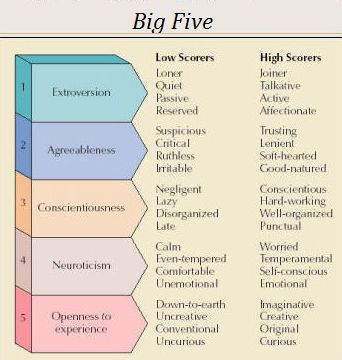
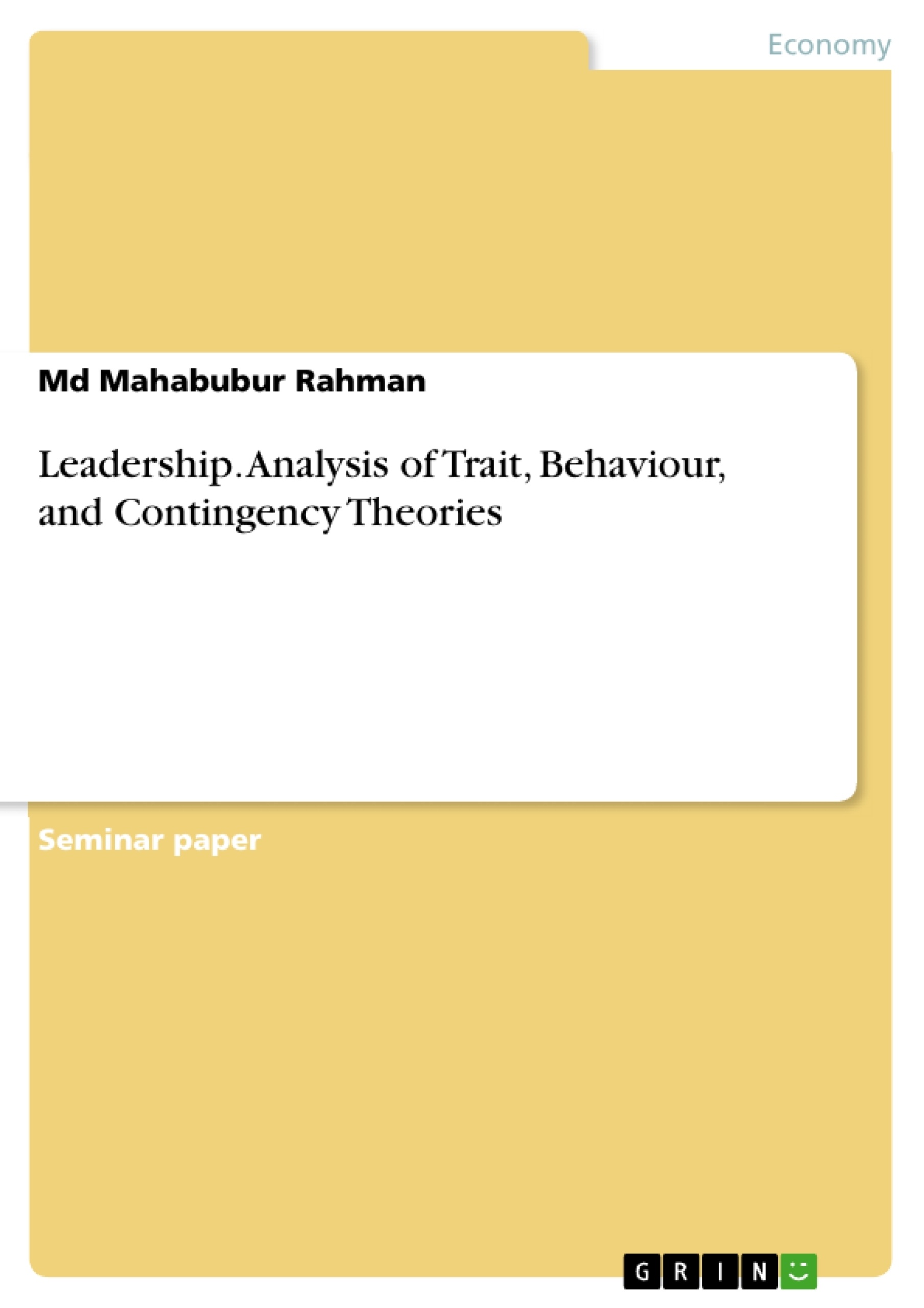
Basic Approaches to Leadership Başkent Üniversitesi
Behavioral Theories of Leadership leadership-central.com
leadership current theories research and future directions pdf – Traits and Skills Theories as the Nexus between Leadership
Leadership Theory Simplified FSPSD200 – uaex.edu
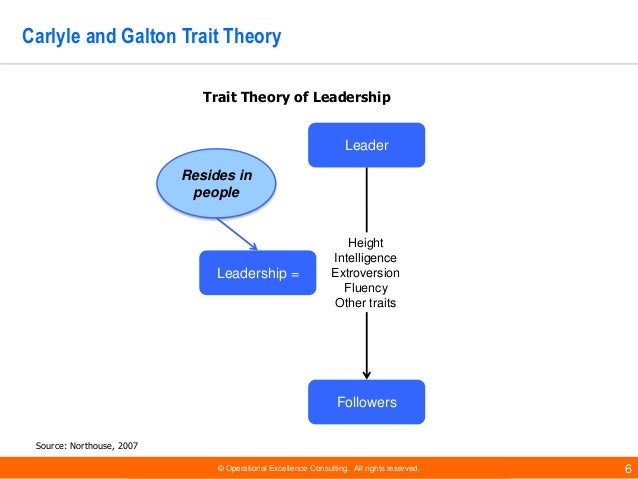
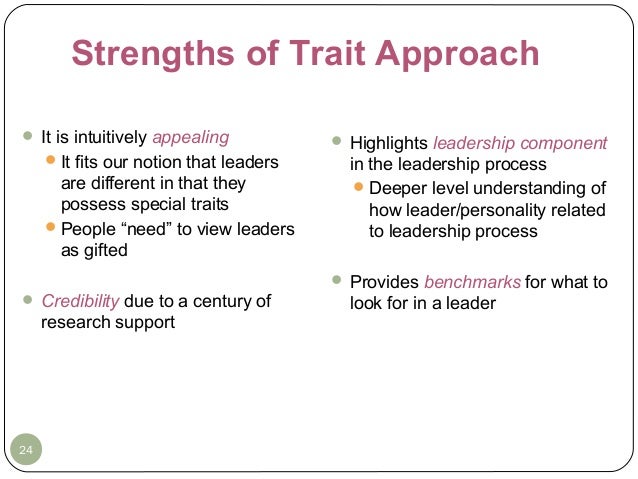
Trait Theories of Personality East Peoria Community High
Leadership do traits matter? Texas Christian University
Style Theory David Burkus
LEADERSHIP TRAITS SCCPSS
Proponents of trait theories believe that a leader is “born.” They often describe leaders in terms of their personal characteristics, such as “charismatic” and “driven.” Behaviorists believe leadership can be taught, or nurtured, by providing the necessary skills to an …
question is one of the difficulties in using trait theories to explain leadership. 3. Contingency Theories: Contingency theories of leadership focus on particular variables related to the environment that might determine which particular style of leadership is best suited for the situation. According to this theory, no leadership style is best in all situations. Success depends upon a number
Style theory differs drastically from trait or skill theories. Instead of focusing on who leaders are, style theories consider what leaders do. At the core of all style theories is the idea that leaders engage in two distinct types of behavior: task behaviors and relationship behaviors. How leaders combine these two behaviors determines their leadership effectiveness. Style theory refers to
• Some personality traits may lead people naturally into leadership roles. This is the Trait Theory. • A crisis or important event may cause a person to rise to the occasion, which brings out extraordinary leadership qualities in an ordinary person. This is the Great Events Theory. • People can choose to become leaders. People can learn leadership skills. This is the Transformational or
Trait theory in Leadership Essay Trait theory in leadership is the belief that all leaders display certain key personality traits. The theory attempts to identify universally applicable characteristics that distinguish leaders from other people.
What is the Trait Theory of Leadership? The search for the characteristics or traits of leaders has existed for centuries. History’s greatest philosophical writings from Plato’s Republic to Plutarch’s Lives have explored the question of, “What qualities distinguish an individual as a leader?”
6.4 TRADITIONAL LEADERSHIP THEORIES. Traditional leadership theories include: (1) trait approaches, such as the ‘great man theory’, which emphasise personal characteristics of the leader; (2) leadership style approaches, such as, the Ohio and Michigan State studies in the 1960s, which emphasise leader behaviours; and, (3) contingency approaches
The trait approach to leadership was one of the earliest theories of leadership. Although it is not a fully articulated theory with well-developed hypotheses, the trait approach formed the basis
The trait theory of leadership is a model based on the notion that people are born with characteristics and personalities that make them either leaders or non-leaders.
The trait theory of leadership is an early assumption that leaders are born and due to this belief, those that possess the correct qualities and traits are better suited to leadership.
6.4.1 Trait Theories. Trait theories of leadership identify the specific personality traits that distinguish leaders from non-leaders. They are based on the premise that leaders are ‘born, not made’ (i.e., that leadership is largely innate, rather than being developed through learning).
Great Man Theory and Trait Theory of Leadership! 1. Great Man Theory of Leadership: One of the early notions of leadership, which is still popular in certain circle, is that leadership is an inborn quality. This is the Great Man Theory of leadership which asserts that leaders in general and great
Behavioral Theories of Leadership leadership-central.com
Leadership Trait Theory SkillsYouNeed
Style theory differs drastically from trait or skill theories. Instead of focusing on who leaders are, style theories consider what leaders do. At the core of all style theories is the idea that leaders engage in two distinct types of behavior: task behaviors and relationship behaviors. How leaders combine these two behaviors determines their leadership effectiveness. Style theory refers to
of leadership theory from its initial focus on Great Man and trait theory to the contemporary study of transformational leadership theory offered by Bass. Although the theoretical underpinnings of leadership theory have changed over
Trait Theory. Eysenck and The Big Five Trait Is a dimension of personality used to categorise individuals according to the degree to which they
Behavioural Theory In contrast with trait theory, behavioural theoryattempts to describe leadership in terms of what leadersdo, while trait theory seeks to explain leadership on thebasis of what leaders are. Leadership according to thisapproach is the result of effective role behaviour.Leadership is shown by a person’s acts more than byhis traits. This is an appropriate new research
The trait theory of leadership is a model based on the notion that people are born with characteristics and personalities that make them either leaders or non-leaders.
According to this theory, leadership behavior is the sum total of all traits that a leader possess. Thus this theory gives the profile of a successful and complete leader. According to this theory, there are five human traits.
Trait Theory.pdf Extraversion And Introversion Anxiety
Trait Leadership Theory Knowledge Center
trait theory provides a base for measurable and testable characteristics such as virtues, race, gender, height, appearance, psychological factors, efficacy factors, cognitive factors, and INTERNATIONAL JOURNAL OF LEADERSHIP STUDIES 9
Understanding the Trait Theory of Leadership – Verywell Mind. Verywellmind.com The trait theory of leadership focuses on identifying different personality traits and characteristics that are linked to successful leadership across a variety of situations.
What is Leadership? Leadership South West Research Report 1 Contents Leadership South West Introduction 3 Defining Leadership 4 Leadership and Management 6 Theories of Leadership 9 Leadership Competencies 15 Leadership and Performance 19 The Shadow Side of Leadership 25 The Future of Leadership 28 Further Reading and Resources 31 References 32 Appendix 1: Portfolio of …
Leadership: Theories and Controversies By Linda D. Henman, Ph.D. One of the most intriguing expressions of human behavior is the leader-follower phenomenon. Since the beginning of civilization, people have sought answers to the questions of who becomes a leader and why. Philosophers, political scientists, and psychologists have produced extensive literature on leaders and leadership, but
The focus of the skill theorists were the skills that made leaders effective. Emphasis however, always remained on leadership as a skill. The most important similarity between the traits and skills theory is that both have the leader at their centre.
6.4.1 Trait Theories. Trait theories of leadership identify the specific personality traits that distinguish leaders from non-leaders. They are based on the premise that leaders are ‘born, not made’ (i.e., that leadership is largely innate, rather than being developed through learning).
Trait Theory of Personality Psychestudy
8 Major Leadership Theories United Nations
The basic premise behind trait theory was that effective leaders are born, not made, thus the name sometimes applied to early versions of this idea, the “great man” theory. Many leadership studies based on this theoretical framework were conducted in the 1930s, 1940s, and 1950s. Leader trait research examined the physical, mental, and social characteristics of individuals. In general
6.4.1 Trait Theories. Trait theories of leadership identify the specific personality traits that distinguish leaders from non-leaders. They are based on the premise that leaders are ‘born, not made’ (i.e., that leadership is largely innate, rather than being developed through learning).
trait theory provides a base for measurable and testable characteristics such as virtues, race, gender, height, appearance, psychological factors, efficacy factors, cognitive factors, and INTERNATIONAL JOURNAL OF LEADERSHIP STUDIES 9
Foundations of Leadership – Summary chart of leadership perspectives/theories/models – V. Harwood Page 2 Trait Theory what the leader is
Trait theories argue that effective leaders share a number of common personality characteristics, or “traits.” Early trait theories said that leadership is an innate, instinctive quality that …
Trait Theory. Eysenck and The Big Five Trait Is a dimension of personality used to categorise individuals according to the degree to which they
trait-behavioral model of leadership effectiveness and then exam- ining the relative validity of leader traits (gender, intelligence, personality) and behaviors (transformational-transactional, initiat-
6.4 TRADITIONAL LEADERSHIP THEORIES. Traditional leadership theories include: (1) trait approaches, such as the ‘great man theory’, which emphasise personal characteristics of the leader; (2) leadership style approaches, such as, the Ohio and Michigan State studies in the 1960s, which emphasise leader behaviours; and, (3) contingency approaches
Leadership trait theory is the idea that people are born with certain character traits or qualities. Since certain traits are associated with proficient leadership, it assumes that if you could identify people with the correct traits, you will be able to identify leaders and people with leadership potential.
Trait Theories of Personality •Gordon Allport –Made one of the earliest attempts to list the traits that made up one’s personality •Found 200 in the dictionary
Core Leadership Theories Leadership Skills From
Trait Theory of Leadership Essay UK Essays UKEssays
Leadership do traits matter? Texas Christian University
While most research today has shifted from traditional trait or personality-based theories to a situation theory, which dictates that the situation in which leadership is exercised is determined by the leadership skills and characteristics of the leader (Avolio, Walumbwa, & Weber, 2009), all contemporary theories can fall under one of the following three perspectives: leadership as a process
A Review of Leadership Theories Principles and Styles and
(PDF) Leadership Theories and Styles A Literature Review
The trait approach within leadership began with an emphasis on identifying the qualities of great people, but it has now shifted back to putting emphasis on the critical role of traits in effective leadership.
TRAIT AND BEHAVIORAL THEORIES OF LEADERSHIP AN
Trait theory of leadership believes that leaders have certain traits that make them a good leader. On the other hand, the behavioral theory of leadership believes that leaders behave in one of
8 Major Leadership Theories United Nations
Traits and Skills Theories as the Nexus between Leadership
Trait Leadership Theory is actually a range of theories which share the belief that all leaders are born with, or at least display, certain key personality traits. Since certain traits are associated with proficient leadership, if one could identify people with the correct traits, one would be able to …
Leadership Trait Theory SkillsYouNeed
A theory of leadership that states that the level of stress in a situation is what impacts whether a leader’s intelligence or experience will be more effective.
TechnoFunc Trait Theory of Leadership
What is the Trait Theory of Leadership? The search for the characteristics or traits of leaders has existed for centuries. History’s greatest philosophical writings from Plato’s Republic to Plutarch’s Lives have explored the question of, “What qualities distinguish an individual as a leader?”
Behavioral Theories of Leadership leadership-central.com
Trait theory of leadership Defining Leadership
Trait Theory of Leadership The trait model of leadership is based on the characteristics of many leaders – both successful and unsuccessful – and is used to predict leadership effectiveness. The resulting lists of traits are then compared to those of potential leaders to assess their likelihood of success or failure.
Understand trait theory of leadership is and how you can
Theories of leadership SlideShare